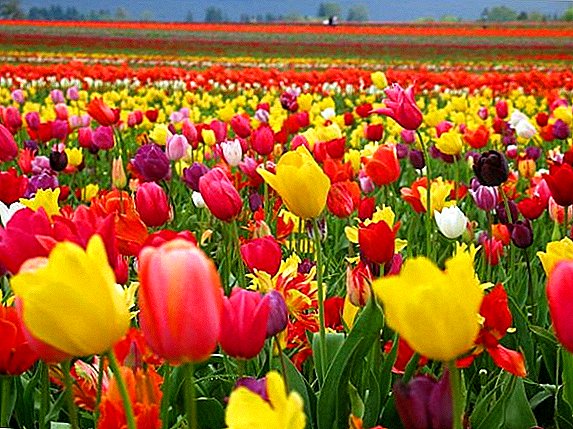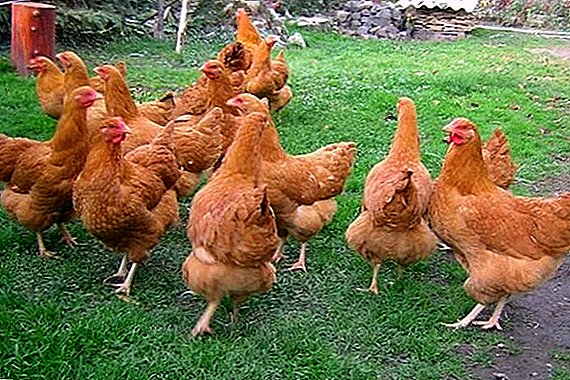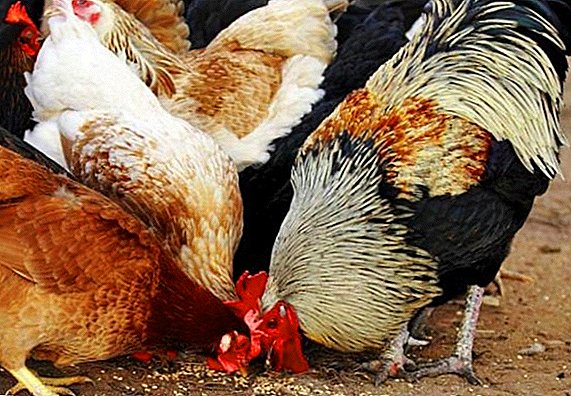 Sunflower today - one of the most common crops, and it is not surprising that many poultry farmers feed chickens with its derivatives.
Sunflower today - one of the most common crops, and it is not surprising that many poultry farmers feed chickens with its derivatives.
As you know, the seeds of this plant have a huge amount of all kinds of vitamins, important fats and other valuable compounds. However, some poultry farmers introduce seeds into the diet of their wards reluctantly and with care, as they believe that this is an overly high-calorie product and it can have a detrimental effect on the health of poultry.
In this article we will consider in detail the benefits and harm of sunflower seeds for the body of chickens, as well as get acquainted with the basic rules of its rational use in feeding birds.
Is it possible to feed chickens with sunflower seeds
Sunflower seeds and their derivatives are widely used by man. Of them prepare a variety of food products, as well as used as a basis for the preparation of feed for farm animals.
But not every such food favorably affects the organism of animals, including chickens, especially after preliminary thermal, mechanical and other processing.
Ordinary
Raw seeds are widely used for feeding chickens of both meat and egg breeds, so you can include them in the diet without fear for the health of the poultry. But you should not forget that the fruits of sunflower have a sufficiently high caloric content, as well as a high content of oil compounds.
Therefore, this food is only suitable for adults. That is why the introduction of seeds into the diet of chickens should be no earlier than 25-30 days after birth.
Important! In case of problems with weight gain in chicks, a sunflower is still allowed into the diet of chickens older than 1 week (no more than 5% of the total amount of feed). However, this feed must be cleaned from the husk and pre-grind.
Young chickens sunflower seeds are introduced into the diet gradually, as an additional ingredient of different feed mixtures. First, the amount of the product should not exceed 1% of the daily feed rate, but over time its volume increases to 15%.  The most favorable periods for entering the seeds of sunflower into the diet are autumn and middle of winter. In the spring and summer, the sunflower in the diet of chickens is not recommended, as this may lead to obesity of the bird.
The most favorable periods for entering the seeds of sunflower into the diet are autumn and middle of winter. In the spring and summer, the sunflower in the diet of chickens is not recommended, as this may lead to obesity of the bird.
Sunflower-based feeds are the main source of energy, and also allow the bird to acquire a fat layer for a safe wintering, which is especially important for regions with a harsh northern climate.
We advise you to read about what can be given to chickens and what is not, how to feed chickens, and whether it is possible to give chickens snow instead of water.
Seeds contain a huge amount of proteins (about 20% of the total mass) and valuable amino acids, which are necessary for the successful development of the bird, as well as its successful productivity.
In addition, we should not forget that raw sunflower seeds have a huge amount of antioxidants, various microelements (potassium, calcium, phosphorus, magnesium, sodium, iron, selenium, manganese, zinc) and vitamins (A, B1, B2, B5 , B6, B9, E). Therefore, the introduction of seeds into the diet of poultry helps to improve its health, general immunity, and also improves the tone and improves the productivity of chickens.
Fried
Despite the fact that roasted sunflower seeds differ in special aromas and attract more chickens than raw sunflower seeds, it is not recommended to include such a product as feed.  In the process of heat treatment, the seeds lose a significant amount of nutrients and vitamins, while the fats are transformed into more complex compounds difficult for the stomach. As a result, roasted seeds have additional irritation to the gastrointestinal tract, which can cause all sorts of digestive disorders.
In the process of heat treatment, the seeds lose a significant amount of nutrients and vitamins, while the fats are transformed into more complex compounds difficult for the stomach. As a result, roasted seeds have additional irritation to the gastrointestinal tract, which can cause all sorts of digestive disorders.
Did you know? Cultural cultivation of sunflower began in North America about 5 thousand years ago, in the territory of modern states of Arizona and New Mexico (USA).
Contraindications and harm
Sunflower seeds are considered safe and healthy food for poultry health, therefore they have practically no contraindications. However, include them in the diet should be carefully. It is strongly not recommended to use sunflower for feeding chicks and young under 25-30 days.
This is due to the fact that these seeds contain a lot of fats, which often negatively affect the weak digestive system of chicks. In this case, the seeds can cause severe diarrhea and other disorders of the digestive system.
Do not abuse seeds and feeding adult chickens. As a result of excessive consumption of fat, the product can cause severe obesity. This threatens serious enough problems not only for health, but also for the productivity of chickens.  Obesity contributes to the deterioration of the cardiovascular system and metabolism, which ultimately can cause the death of the bird. In addition, excessive weight affects the egg production of chickens, as well as the ability to instantly gain muscle mass.
Obesity contributes to the deterioration of the cardiovascular system and metabolism, which ultimately can cause the death of the bird. In addition, excessive weight affects the egg production of chickens, as well as the ability to instantly gain muscle mass.
In this case, obesity can cause loss of agricultural value of poultry and serious losses for the farm.
Important! Sunflower seeds are not recommended for use as feed in regions with difficult environmental conditions. This plant is able to actively accumulate and concentrate in its fruits highly toxic cadmium and lead, which are capable of Not only call in chickens All sorts of pathology, but also accumulate in the final products of the poultry industry.
Is it possible to give husks from seeds
Sunflower husks are one of the most widespread by-products of the cultivation of this plant. The share of the husk is about 15-20% of the total weight of the seeds, so when harvesting and processing the crop, the question arises of its utilization or expedient use in economic needs.
Including as an additional feed for valuable breeds of animals and birds. As you know, the husk is poor in all sorts of proteins, fats, vitamins and minerals, and its nutritional value for the body of chickens is quite low.  This product contains a large amount of fiber (about 50% of the total mass) and other complex fibers. Therefore, it is strongly not recommended to introduce pure husk into the diet of chickens: due to the special structure of the intestines, their bodies are not able to properly break down and absorb foods rich in complex fibers.
This product contains a large amount of fiber (about 50% of the total mass) and other complex fibers. Therefore, it is strongly not recommended to introduce pure husk into the diet of chickens: due to the special structure of the intestines, their bodies are not able to properly break down and absorb foods rich in complex fibers.
Such feeds will not positively affect the productivity and health of the birds, but instead may cause irritation of the gastrointestinal tract and other digestive disorders.
Did you know? For the first time, sunflower oil was pressed in the UK in 1716. Until that time, sunflowers were grown by Europeans exclusively for decorative purposes.
What else can feed chickens
In order to provide the hens with a proper and rich diet, grain feeds are often not enough. Despite their high nutritional value and energy value, they often do not contain all the elements necessary for vital activity.  Therefore, in addition to the grain base, chickens must be fed with a variety of vegetables and other products with a high content of important vitamins.
Therefore, in addition to the grain base, chickens must be fed with a variety of vegetables and other products with a high content of important vitamins.
Potatoes
Potatoes are quite useful and rich in nutrients, so the diet of chickens must be enriched with this product. Daily use of potatoes contributes to the saturation of the body with ascorbic acid, vitamins B2, B3, B6, as well as healthy carbohydrates.
Read more about how to give potatoes to chickens.
This makes it possible to optimize cellular metabolism in the body, to accelerate the processes of protein synthesis, which has a positive effect not only on the vital activity of chickens, but also on their productivity as a whole.
However, potatoes are safe for the body of the bird only in boiled form. The raw vegetable contains a toxic substance for the bird, solanine, which is destroyed only under the influence of prolonged heat treatment.  The product is used for food not earlier than 3 weeks after the birth of chickens, while the average daily rate for an adult individual is not more than 100 g, and for young animals - not more than 50 g.
The product is used for food not earlier than 3 weeks after the birth of chickens, while the average daily rate for an adult individual is not more than 100 g, and for young animals - not more than 50 g.
Important! Potato peelings are strongly discouraged as chicken feed, as this is an overly coarse food for their stomachs.
A fish
Quality fish is the main source of potassium and phosphorus, so without it it is also impossible to imagine a healthy diet of chickens.
Fish are particularly important during the development of the musculoskeletal system and muscles, as well as during the active production of eggs, since a sufficient amount of calcium in just a few days can activate egg production and improve the appearance of eggs.
The feed is suitable for exceptionally well-boiled unsalted fish, as in its raw form it can cause helminth infections and all sorts of disorders of the digestive system. Fish feedings are used no more than 2-3 times a week, 5-6 g per individual per day, and the product should be thoroughly mixed with cereals or other feeds.
Cabbage
Cabbage is one of the compulsory vegetables, which should be included in the diet of productive bird species from the 20th to the 25th day after birth. This vegetable is one of the main sources of vitamins and valuable minerals that help maintain the body in the right tone and contribute to the development of strong immunity.  In addition, cabbage is able to clean the intestines, as well as eliminate all kinds of ulcerative erosion in the stomach and improve digestion. Often, the vegetable is given to the bird in a raw, thoroughly chopped form, mixed with other vegetables or dry food.
In addition, cabbage is able to clean the intestines, as well as eliminate all kinds of ulcerative erosion in the stomach and improve digestion. Often, the vegetable is given to the bird in a raw, thoroughly chopped form, mixed with other vegetables or dry food.
Whenever possible cabbage is marinated, and then used as a vitamin supplement in winter. Giving cabbage to chickens can be daily, while the maximum daily rate for an adult individual is within 50-60 g.
Find out whether you can give chickens salt, oats, garlic, onions, meat and bone meal and foam.
Beans
High-quality varieties of beans are an excellent source of protein and important amino acids. That is why the beans must be included in the diet of chickens during the period of active growth and weight gain, as well as during laying, to improve egg production and egg quality.
As a feed, beans are administered no earlier than at 3-4 weeks of young stock, with exceptionally well-cooked beans being considered the most useful and convenient to eat.  Beans can be used daily, while its amount in the diet can be reduced to 1/4 of the entire mass of food. But the most useful are considered periodic feedings of legumes, which alternate with other protein-containing feed.
Beans can be used daily, while its amount in the diet can be reduced to 1/4 of the entire mass of food. But the most useful are considered periodic feedings of legumes, which alternate with other protein-containing feed.
Bread
Often, foods prepared for human consumption are not recommended as feed for chickens. However, a small amount of bread in their diet favorably affects growth, development and productivity.
Read more about whether it is possible to give bread to the laying hens.
It fills the body of the bird with important proteins, carbohydrates and vitamins of group B, which is very important for the proper functioning of the immune system, maintaining general health, as well as productivity. As food suitable only thoroughly dried crackers from rye bread.
Grain dressings give chickens periodically, short-term courses and exclusively for adult birds, while the rusks are thoroughly ground and mixed with grain or dry feed mixtures. The maximum amount of such dressing should not exceed 40% of the total mass of feed.  A proper and rich diet for highly productive breeds of chickens is the main condition not only for good health of the bird, but also for obtaining high-quality poultry products. For these purposes, all sorts of supplements are used, one of which is sunflower seeds.
A proper and rich diet for highly productive breeds of chickens is the main condition not only for good health of the bird, but also for obtaining high-quality poultry products. For these purposes, all sorts of supplements are used, one of which is sunflower seeds.
Did you know? Wild ancestors of chickens were first domesticated on the territory of modern Ethiopia about 3 thousand years ago. Thus, this bird is considered one of the oldest farm animals.But in order for the seeds to bring only good to the bird, one should strictly follow the recommendations on feeding the bird with this product. Otherwise, excessively oily food can cause obesity in chickens and a sharp decline in the agricultural value of the final product.
Reviews from the network














